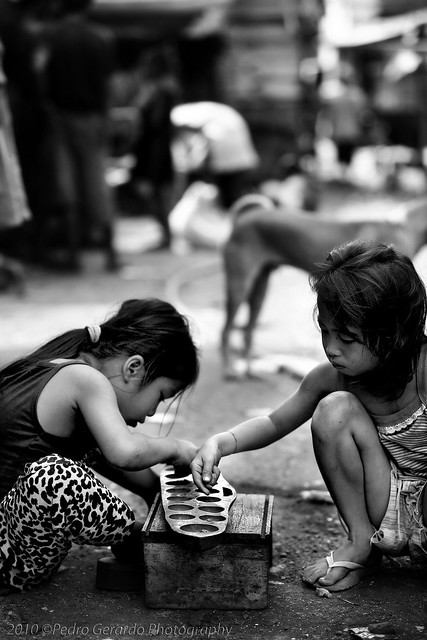
-
МјРЇСІИёСЖШИМі
-
 MINUTE TO WIN IT
MINUTE TO WIN IT 46,757
46,757 -
 Apple Eating Contest Game
Apple Eating Contest Game 34,211
34,211 -
 SINGING BEE
SINGING BEE 23,703
23,703 -
 DEAL OR NO DEAL23,324
DEAL OR NO DEAL23,324 -
 rodeo masbatenio19,401
rodeo masbatenio19,401 -
 Luksong Lubid14,251
Luksong Lubid14,251 -
 EGG AND SPOON RACE12,216
EGG AND SPOON RACE12,216 -
 Tumbang Preso12,151
Tumbang Preso12,151 -
 HULA HOOP12,136
HULA HOOP12,136 -
 BUNONG BRASO ( ARM WRESTLING)12,082
BUNONG BRASO ( ARM WRESTLING)12,082
SUNGKA
Sungka is an important means for creating identity,
particularly for Philippine migrants. This can be seen in
sungka competitions, which are organized in the Philippines,
and in the representation of Philippine culture at cultural
festivals through Sungka demonstrations. The identity
forming function of the game is also a central theme in
Sungka and Smiling Irish Eyes, A Boy discovers what it
means to be Half-Irish and Half-Filipino by Natalie
Gonzales-Sullaway. The feminist poet and communication
scientist Alison M. De La Cruz wrote in 1999 a one-woman
performance called Sungka, which analyses the societal
and family-related expectations in regard to gender-
specific behavior and sexuality, race and ethnic affiliation,
by comparing it to a game of Sungka. De La Cruz also reflects
in her performance how she has come to terms with her
lesbian coming-out. Her poem That Age, which was part of
the performance, has become well-known in the America.


Moreover, sungka is still used by fortunetellers and prophets,
which are called on the Philippines bailan or maghuhula, for
divinatory purposes. Older people hope to find out with their help
whether the journey of a youth is favorable at a certain day,
and girls, whether they will marry one day, and, in case they will,
when this will be. The game is usually played outdoors because
there is a Filipino superstition about a house will burn down if it's
played indoors.

In past times sungka boards were also used for mathematical
calculations, which were researched by Indian
ethnomathematicians.
Although the sungka rules are not much different from
those of congkak, sungka is perceived as a genuinely Philippine
game by native players.
Rules
The oblong game board (sungka(h)an), which is usually carved in wood (e.g. mahagany), consists of two rows of seven small pits each. In addition, there are at either end a large store (bahay) for the captured stones. Each player owns the store to his right.
In each small pit are initially seven counters (sigay), usually cowrie shells.'
 |
- ЁЄ
- ЁЄDr.quack quack game (THE HUMAN
- ЁЄSLIPPER GAME
- ЁЄBati-Cobra
- ЁЄMONOPOLY GAME
- ЁЄcoconut shell race/sangkayaw
- ЁЄJack\'n\'Poy
- ЁЄTEN-TWENTY
- ЁЄtomato dance
- ЁЄSerereng
- ЁЄ\"Araw - Lilim\" (Day and Nigh
- ЁЄMAALIS-ALIS/ kaya, kulob (palm
- ЁЄBottle and Straw Game
- ЁЄHabulan ng Baboy (chase and ca
- ЁЄPING TAC TOE



- ЁЄSalapan Festival
- ЁЄEmpanada Festival (Batac City)
- ЁЄPADUL-ONG FESTIVAL
- ЁЄKaumahan Festival in Barili
- ЁЄKAGASANGAN FESTIVAL
- ЁЄLalin Festival in Asturias
- ЁЄTinabuay Festival
- ЁЄGayon Bicol Festival
- ЁЄPINYASAN FESTIVAL in CAMARINES
- ЁЄMAGAYON FESTIVAL
- ЁЄBANAUAN FESTIVAL (BARANGAY.GUA
- ЁЄThe Tuna Festival in Gensan
- ЁЄPINTOS FESTIVAL BOGO CITY, CEB
- ЁЄPanaad sa Negros
- ЁЄPasalamat Festival



- ЁЄ
- ЁЄCEBU WESTOWN LAGOON
- ЁЄGREEN LAGOON, COMPOSTELA
- ЁЄCALLAO CAVE
- ЁЄMOUNT PINATUBO IN PHILIPPINES
- ЁЄBATAN ISLAND in Batanes.
- ЁЄCALAGUAS ISLAND, CAMARINES NOR
- ЁЄAGHO ISLAND
- ЁЄCARAMOAN ISLAND IN CAMARINES S
- ЁЄSAMBAWAN ISLAND
- ЁЄPLACES TO VISIT IN LANAO DEL N
- ЁЄPLACES TO VISIT IN ZAMBOANGA C
- ЁЄPlaces to visit in Rizal Provi
- ЁЄHISTORIC TOWN OF VIGAN CITY, I
- ЁЄCAMBUGAHAY FALLS, SIQUIJOR ISL













 ЧЪРкДхФФ ОпАЃЛѓДу ПРЧТ
ЧЪРкДхФФ ОпАЃЛѓДу ПРЧТ 13ГтПЌМг МвКёРкИИСЗ 1РЇ
13ГтПЌМг МвКёРкИИСЗ 1РЇ

 ГЛАд ИТДТ ОюЧаПј УЃБт
ГЛАд ИТДТ ОюЧаПј УЃБт
 ИЎОѓ ЧаБГ ЙцЙЎБт
ИЎОѓ ЧаБГ ЙцЙЎБт
 СжИЛПЁ ГЛАЁ ОЕ КёПыРК?
СжИЛПЁ ГЛАЁ ОЕ КёПыРК? УжАэАЁМККё РЬКЅЦЎ СёБтБт
УжАэАЁМККё РЬКЅЦЎ СёБтБт
 ЧіСіПЁМЕЕ ЧЪРкДхФФ!
ЧіСіПЁМЕЕ ЧЪРкДхФФ! ЧіСіПЁМ АЁДЩЧб
ЧіСіПЁМ АЁДЩЧб









 ЧЪРк ЦЏБо Ч§ХУ! ФСНУОюСі МКёНК
ЧЪРк ЦЏБо Ч§ХУ! ФСНУОюСі МКёНК



































